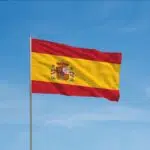Saint Basil’s Day is annually celebrated on January 1 in the Eastern Churches, on January 2 in the Western Churches, and on January 14 in churches that follow the Julian calendar. It starts with a divine liturgy in honor of the Byzantine bishop of Caesarea, after a matin service on the morning of the feast. On the evening before St. Basil’s Day, Great Vespers is conducted. The Father of Communal Monasticisms, St. Basil is the patron saint for hospital administrators and reformers and the region of Cappadocia in Turkey.
History of Saint Basil's Day
St. Basil was on his journey to becoming a lawyer and teacher when he suddenly felt drawn towards religious life. He traveled across Egypt, Palestine, Syria, and Mesopotamia, visiting monks before returning to Caesarea in Cappadocia, Asia Minor (modern-day Turkey). He left again for the Iris River in Pontus, where his mother and sister, Macrina the Younger, were already treading the path of ascetical life. Owing to the positive influence of his sister, he embraced this life and abandoned his worldly career.
By 358 A.D., he started gathering like-minded disciples, including his brother. They founded a monastic settlement on his family’s estate near Annes. His mother and sister, along with other women, devoted themselves to a life of prayer and charity. When the bishop of his country resigned around 370, St. Basil was elected his successor. The Church of Christ was entrusted to him from then on, and he tended it for eight years, living in voluntary poverty and asceticism. He defended holy Orthodoxy against the Arian heresy as a worthy successor of the Apostles. His principles have a significant influence on Eastern monasticism today.
On January 1, families gather to share ‘Vasilopita’ or ‘St. Basil’s bread,’ a sweet bread in which a coin is placed. The person who gets the slice of bread with the coin inside will have good luck in the coming year. The head of the household makes a cross sign over the bread, cuts the first one in offering to Christ, and the second and third slices to St. Basil and the Virgin Mary. The next piece is for the head of the household, and the remaining portions are distributed evenly among the remaining members from eldest to youngest. Greeks also celebrate this day by singing carols and incorporating other customs that bring good luck.
Saint Basil's Day timeline
St. Basil the Great is born to Basil the Elder and Emmelia of Caesarea, a wealthy Cappadocian Greek family.
St. Basil meets charismatic ascetic Eustathius of Sebaste, through which he experiences a spiritual awakening that changes his life forever.
St. Basil makes an extensive tour of the monasteries of Egypt.
St Basil assists the Cappadocian bishops at a synod in Constantinople.
St. Basil is called back to Caesarea when the church is threatened by the Arian emperor Valens.
At the age of 49, the great St. Basil departs this world to be with the Lord.
The Western Church moves St. Basil’s Day to June 14, when he is believed to have been ordained a bishop, retaining this new date until 1969.
Saint Basil's Day FAQs
Who celebrates Saint Basil's Day?
The orthodox churches perform the Liturgy of St. Basil on his feast day. The root of this remembrance can however be found in ancient Roman traditions.
What does ‘Basil’ mean in accordance with this holiday?
It is believed that St. Basil’s Day marks the day when Basil of Caesarea died. St. Basil is also a forefather of the Greek Orthodox Church and one of the most distinguished Doctors of the Church.
What is St. Basil famous for?
St. Basil the Great was a Church Father who defended the orthodox faith against the Arian heresy. He is also credited to have advanced such Christian theology as the doctrine of the Holy Trinity and is a highly respected saint in the Eastern and Western churches.
How To Celebrate Saint Basil's Day
Serve vasilopita
An important tradition in celebrating St. Basil’s Day is serving vasilopita, a rich bread that is baked with a coin inside. Gather your friends and family at home and enjoy this important tradition on this day.
Visit your friends and family’s homes
On St. Basil’s Day, it is a custom to visit the homes of friends and relatives. Indulge in some New Year's carol singing, and keep an extra place at the table for Saint Basil.
Feed the poor
St. Basil was known to care for the poor, and it would be a fitting tribute to carry on his legacy on his feast day. While you enjoy your meal at home, prepare some extra food to distribute to the poor in the name of St. Basil.
5 Important Facts About Saint Basil
Cappadocian Fathers
St. Basil, his brother Gregory of Nyssa, and his friend Gregory of Nazianzus are collectively referred to as the Cappadocian Fathers, who advanced the development of early Christian theology.
Great Hierarch
St. Basil, Gregory of Nazianzus, and John Chrysostom have been given the title of Great Hierarch by the Eastern Orthodox and Catholic Churches.
The Ouranophantor
St. Basil is referred to as the epithet ‘Ouranophantor,’ which means ‘revealer of heavenly mysteries.’
St. Basil’s writings
St. Basil’s principal writings are “On the Holy Spirit” and “Refutation of the Apology of the Impious Eunomius.”
Long Christian pedigree
St. Basil came from a long line of devout Christians at a time when Christians were widely persecuted; his maternal grandfather was a martyr, his uncle was a bishop, his parents and all four of his siblings were also venerated as saints.
Why Saint Basil's Day is Important
St. Basil was noble and influential
St. Basil was equipped with intellectual brilliance, and he sincerely cared for the poor. He even brought moderation in the austere practices previously characteristic of monastic life. Owing to this influence, many religious orders in Eastern Christianity bear his name.
He is highly commemorated
In the Roman Catholic Church, The Congregation of St. Basil is named after him. He was given the title ‘Doctor of the Church’ for his contributions to the debate initiated by the Arian controversy.
He made many significant contributions
St. Basil is credited with defining the terms ‘ousia’ (essence/substance) and ‘hypostasis’ (person/reality). He also defined the classic formulation of three persons in one nature. His greatest contribution was his insistence on the divinity and consubstantiality of the Holy Spirit.
Saint Basil's Day dates
| Year | Date | Day |
|---|---|---|
| 2025 | January 2 | Thursday |
| 2026 | January 2 | Friday |
| 2027 | January 2 | Saturday |
| 2028 | January 2 | Sunday |
| 2029 | January 2 | Tuesday |





















